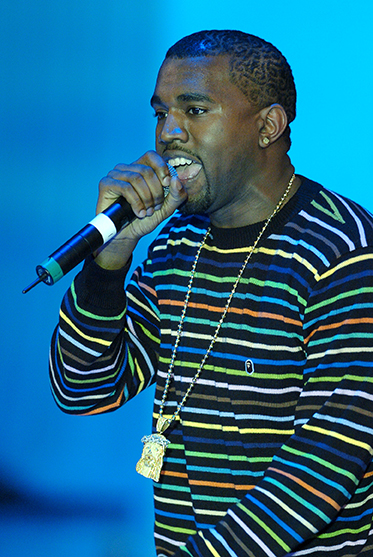Kanye West approaches race through album, Confederate Flag

Kanye West performs at the 4th Annual “ten” Fashion Show presented by General Motors in Los Angeles, California, February 22, 2005.
Criticism is nothing new to Kanye West, one of the most highly regarded hip-hop artists of our time. Whether it is beating up paparazzi, embarrassing teenage pop icons in front of thousands or Twitter feuds with late-night show hosts, West always seems to be in the headlines. Some argue that all of these antics are merely PR stunts, while others say he is just a special case.
In the past few weeks, West has done it again. In lieu of his national tour, he is selling merchandise decorated with the Confederate flag.
This has sparked a mix of emotions from the public. Many say that this is disrespectful to the black community and have dubbed West as a “disgrace.” Others say that this is a brilliant move by West to overrun the racism and hatred associated with the flag.
West, in an interview with AMP Radio, said, “the Confederate flag represented slavery in a way…I took the flag and made it my flag. It’s my flag now. Now what you gonna do?”
While for some this statement has caused even more perplexity on the issue, it also provides some clarity. West is trying to convey his message in a very subtle way; he clearly does not support straight answers. Because the flag embodies racism and white supremacy in many cases, West, a black man, taking the flag into his own hands is, in a way, disassociating it with those negative ideas. Now the flag is associated with slavery, injustice and Kanye West. Not only is West attempting to dilute the hatred behind the symbol, but he is also attempting to alter it’s meaning.
This idea is reinforced by the themes that West’s music has revolved around throughout his career. Noisey.vice.com, a website with music reviews and news, explains how, “his first two records, College Dropout and Late Registration…an encapsulation of a contradiction at the core of contemporary society, in that success is led not in the need to fit in, but in a Darwinist grab for materialistic matter.”
This theme, coupled with his unique approach on race in the album “Yeezus” through the likes of “New Slaves” and “Black Skinhead” provide us with some of West’s reasoning. He is well aware of the response that this approach will get. David Cook, a hip-hop historian and professor at San Francisco State University said, “Kanye doesn’t move by accident.” His approach to the issue is unorthodox, but so is almost everything else about West.
Regardless of the fact that some accept this as an attempt to shatter the current image of the confederate flag, there has also been substantial opposition. Rev. Al Sharpton has begun a nationwide boycott of West’s clothing. “The Confederate flag symbolizes dehumanization, injustice and pain. It is a stark reminder of an era in our history that was defined by the abhorrent practice of slavery,” Sharpton said.
West’s words show that he agrees, so many would say that the reverend is missing the point.
If one has a close understanding of West’s music and the messages he attempts to convey through it, they might not have as harsh of a view as Sharpton. Whichever side someone takes, they cannot deny West’s ability to gain publicity— negative or positive.
Perhaps the best way to settle the debate is to go to his show and hear it from Yeezus himself.






